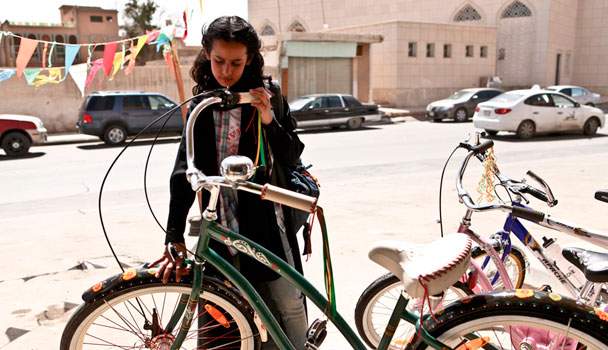Wadjda
The first ever film directed by a Saudi woman.
Overview
Coming of age is never that easy, especially when you’re a young woman in Saudi Arabia. Only certain kinds of people manage to break society's molds, but as soon as you see the totally Converse sneakers sticking out from beneath the regulation abaya (robe worn over clothes) you know that Wadjda has got what it takes.
Wadjda is the engaging and heartwarming portrait of a 10 year old girl learning about the world and starting the journey of transition from girl to woman. Central to the story is Wadja's desire to ride a bicycle, which in Saudi Arabia is something girls don't do. But Wadjda is determined to out race her neighbourhood pal, Abdullah, but she can't do it without a bike.
The savvy and determined 10 year-old tries everything she can to get her hands on a bike, including selling forbidden items at school. When the Koran competition is announced it seems the universe is on her side. Not only does Wadjda have a chance to redeem herself, but first prize is 1000 riyals, more than enough to buy her bike.
As we follow Wadjda on her quest, we learn of the many obstacles faced by women in Saudi Arabia. Photographs are forbidden in school, as are magazines, nail polish and other adornments that may express one’s individuality. In Wadjda’s small town people are conservative and rule-abiding. This means covering your hair and face when in public and not allowing men to hear you laugh because "a woman's voice is her nakedness".
The other thread of the story follows Wadjda's mother as she tries to hold it all together: earning a decent income while dealing with a belligerent driver, keeping her rebellious daughter in line and trying to hold on to her husband, who has his eye on someone else.
Director Haifaa Al-Mansour’s feature film Wadjda has gained considerable international recognition, including an award at the Venice Film Festival and a BAFTA nomination. The film tackles a heavy topic -- the oppression of women in Saudi Arabia -- with grace and cinematic finesse; but it is also the first film to be shot entirely in the kingdom and to be directed by a Saudi woman.
The film has been criticised for painting an unrealistic picture of Saudi Arabia and I did find myself wondering how true to life the 'rules' were. On the one hand, there is no mention of the Religious Police, who enforce these rules, while on the other, in many of the big cities Saudi women enjoy a modern and Westernised lifestyle, holding down steady jobs and no longer covering their faces.
The crux of the matter is, that for Wadjda to reach the world, it had to pass through (male) censorship. As the film has government support, it seems clear that some concessions are likely to have been made. Nevertheless, Wadja is culturally and historically significant and a very entertaining watch at that.





